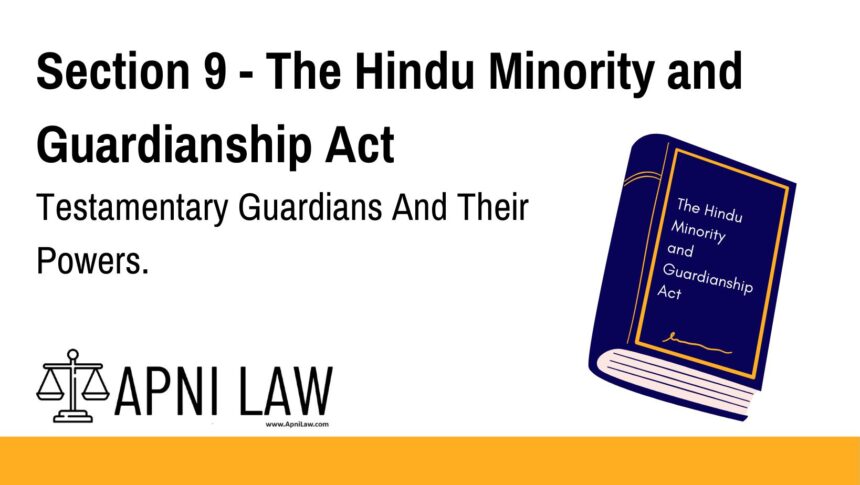Code
“(1) A Hindu father entitled to act as the natural guardian of his minor legitimate children may, by will, appoint a guardian for any of them in respect of the minor’s person or in respect of the minor’s property (other than the undivided interest referred to in section 12) or in respect of both.
(2) An appointment made under sub-section (1) shall have no effect if the father predeceases the mother, but shall revive if the mother dies without appointing, by will, any person as guardian.
(3) A Hindu widow entitled to act as the natural guardian of her minor legitimate children, and a Hindu mother entitled to act as the natural guardian of her minor legitimate children by reason of the fact that the father has become disentitled to act as such, may, by will, appoint a guardian for any of them in respect of the minor’s person or in respect of the minor’s property (other than the undivided interest referred to in section 12) or in respect of both.
(4) A Hindu mother entitled to act as the natural guardian of her minor illegitimate children may, by will, appoint a guardian for any of them in respect of the minor’s person or in respect of the minor’s property or in respect of both.
(5) The guardian so appointed by will has the right to act as the minor’s guardian after the death of the minor’s father or mother, as the case may be, and to exercise all the rights of a natural guardian under this Act to such extent and subject to such restrictions, if any, as are specified in this Act and in the will.
(6) The right of the guardian so appointed by will shall, where the minor is a girl, cease on her marriage.”
— Section 9, The Hindu Minority and Guardianship Act, 1956
Explanation
Section 9 deals with the concept of a “testamentary guardian” — a guardian appointed through a will by either parent of a Hindu minor.
Key Takeaways:
-
A Hindu father can appoint a guardian via will for his legitimate minor children (excluding undivided joint family property).
-
This testamentary appointment is only valid if the father dies before the mother, and she does not appoint another guardian by will.
-
A Hindu widow or a mother (if she becomes the natural guardian due to father’s disqualification) can also appoint a guardian by will.
-
Mothers can appoint guardians even for their illegitimate minor children.
-
The appointed guardian assumes all rights of a natural guardian after the parent’s death, unless limited by the will or the Act.
-
For minor girls, the testamentary guardian’s rights end upon her marriage.
Illustrations
🔹 Example 1:
Ravi, a Hindu father, appoints his brother as guardian of his minor son’s property by will.
→ If Ravi dies and the mother is alive and does not object or appoint someone else, the brother becomes guardian after the mother’s death.
🔹 Example 2:
Meera, a Hindu widow and natural guardian of her children, appoints her sister as a guardian by will.
→ On Meera’s death, her sister becomes the guardian of the minor children.
🔹 Example 3:
A mother appoints a guardian for her illegitimate minor daughter by will.
→ That guardian’s rights end when the daughter gets married.
Common Questions & Answers
Q1: Can both parents appoint different guardians by will?
Yes, but the mother’s appointment overrides the father’s if she survives him.
Q2: Is court approval required for a testamentary guardian?
No, the appointment is valid by virtue of the will, unless challenged or contrary to the minor’s welfare.
Q3: Can a testamentary guardian manage joint family property?
No, Section 12 prohibits appointment of a guardian for a minor’s undivided interest in joint family property under such conditions.
Q4: What if the testamentary guardian misuses the property?
They can be removed by the court in the interest of the minor under the Guardians and Wards Act, 1890.
Conclusion
Section 9 recognizes the parental right to plan for a child’s care through a will. This is crucial in securing the welfare and management of the minor’s person and property after a parent’s death. The law ensures that such appointments respect family hierarchy, minor’s interests, and limitations imposed by custom and existing guardianship principles.








